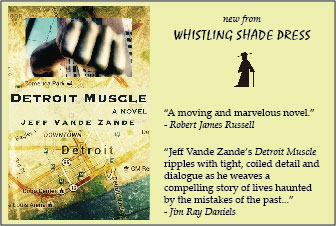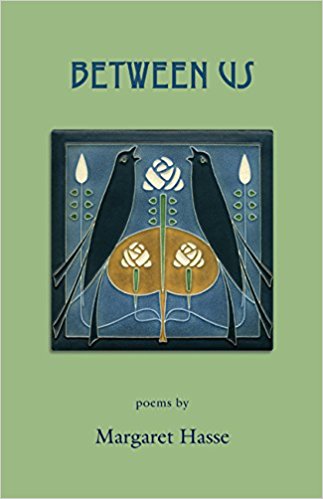
| <- Back to main page |

|
(Nodin Press)
Finishing Margaret Hasse’s new poetry collection, Between Us, made me feel that I had just sat down to coffee with a good friend—that same satisfying sense of having a dozen new garden paths to mentally loiter down. The cover presents two stylized birds singing (in harmony, one feels), and the epigram, from Walt Whitman, is more like an invitation: “I might not tell everybody, but I will tell you.”
Hasse’s poetry has always been comfortably accessible, as well as intimate. As with her last collection, Earth’s Appetite, the poems in Between Us are filled with life updates, travel memories, the state of the world, holidays, the odd accoutrements and situations we gather about us, writing, and views of nature. Like old shoes, the poems are easy to slip into, walk around in. Yet they’re never trivially autobiographical; in fact, exact circumstances are hard to pin down. In “After His Diagnosis”, for instance, we are not sure what the diagnosis was for, nor who “he” is (husband? son? friend?). And it doesn’t really matter, as the mood in the poem, evoked through natural imagery, is universal:
Weeks after the ice-out
last fall’s leaves
make a pathway
to the lake, radiant blue
and still deathly cold.

Hasse writes in a more personal tone than Whitman, but she speaks in the same wide-open language, free from enjambment and unnecessary complexity, so plain that it might trick you into thinking it’s all that simple. Her “Waiting for the Night Train” recalls Whitman’s imagistic “Cavalry Crossing a Ford”:
My train is coming on a moonlit night.
From miles away I slowly hear it coming.
Over the old oily bridges,
past a house where all the shades are drawn.
Throughout the subtly interwoven tapestry of poems, Hasse seems to be standing at the point where she is being equally pulled back by memories of the past and pushed forward by the inexorable rush of time. Between the two are glimpses of sheer beauty. From “First Morning in the Mountains”, a poem that feels like it could have been written in China in 900 AD:
The sun moved on
from that small clearing
into thick forest drawn
by the song of invisible birds.
Current events venture into the conversation only rarely, as in “Come Home, Our Sons”, a poem about citizen-police tensions that references Philando Castile. But much of the collection has an end-of-pilgrimage feeling, from the opening poem, “Revelation”, to the curious “Dream Poem with Bat and the Buddha”, and the lovely, floating “Time Comes”:
It’s time to sail
an unencumbered life
in the boat of good-byes,
just you, just me
not even bothering
to row, drifting on water
This calls to mind the closing lines of the camping poem “Why Go To the Wilderness”:
All night the river pours
its heart out over the rocks.
And the penultimate poem, “Last Words”, returns to the same metaphor:
Have we done what we came here for?
We are dipped from a river.
Hasse leaves her question unanswered, the dialogue open. We do, after all, seem to be in a conversation. And so we leave, hoping that “Last Words” doesn’t mean last poem, and that Between Us is not a final meeting.
- Joel Van Valin